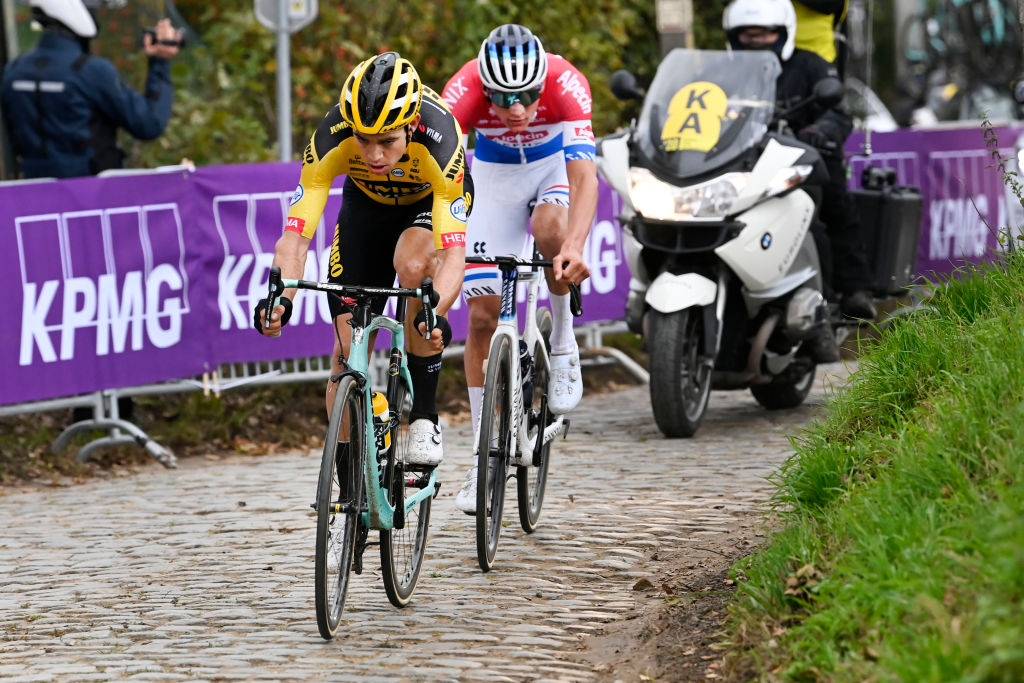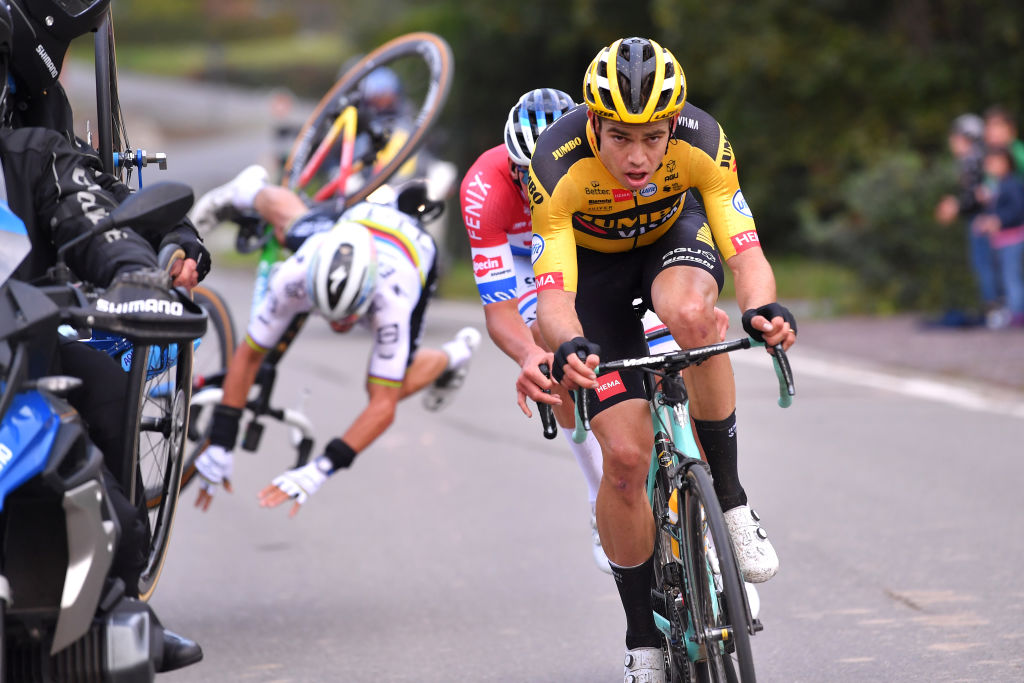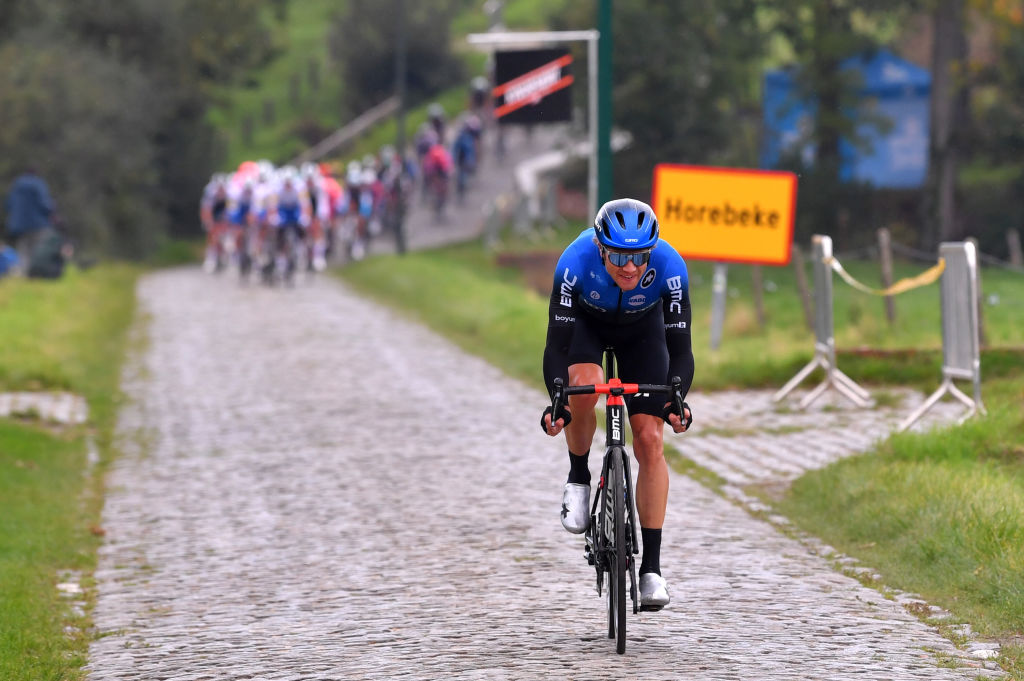5 conclusions from the men's Tour of Flanders
A new Classics rivalry, moto mayhem, aggressive NTT, and more

The 2020 Tour of Flanders drew a premature, but also belated, end to the cobbled Classic season, with Mathieu van der Poel (Alpecin-Fenix) outsprinting long-time rival Wout van Aert (Jumbo-Visma) to the line in Oudenaarde.
It was a race of numerous talking points, from battles up front to further back, crashes and polemic, and the dawn of a new long-term Classics battle.
We've looked back at the race and picked out five of the biggest talking points to draw five conclusions from the Tour of Flanders. Read on to find out what we thought.
The start of another era-defining Classics rivalry?
Through the years, we've seen a number of Classics rivalries play out from spring to spring, as giants of the cobbles do battle at Flanders and Paris-Roubaix. Eddy Merckx vs Roger De Vlaeminck and Tom Boonen vs Fabian Cancellara come to mind… Did Flanders realise the birth of a new multi-year Classics war?
Mathieu van der Poel and Wout van Aert have already been fighting with one another for years already, moving from junior to under-23 to elite level in cyclo-cross. They've both dabbled in ever-expanding road seasons in recent years, but their battles on the road have been less frequent.
So infrequent, in fact, that the pair have only shared 22 race days in their road careers, with just eight of those – Gent-Wevelgem, Flanders and Amstel Gold Race last year and Strade Bianche, Milan-San Remo, Milano-Torino, Gent-Wevelgem and Flanders – coming in the last two years.
The sense, though, is that Sunday was the first time they've come face to face at a top-level race that suited them both in top form. They were the class of the field, albeit with a few caveats, and at 25 and 26 years old, respectively, Van der Poel and Van Aert look like they'll be on top at the cobbled Classics for years to come.
Get The Leadout Newsletter
The latest race content, interviews, features, reviews and expert buying guides, direct to your inbox!
The best part is that we won't have to wait 12 months for the rematch. Assuming next season returns to a regular schedule (rather a big assumption at the moment), we should see 'the two Vans' clash again on the road in just six months – and they'll be back racing 'cross in the winter, too.
More moto mayhem

The first of those caveats, then, is Julian Alaphilippe. The Deceuninck-QuickStep – or, rather, Elegant-QuickStep – rider was the only man equal to Van der Poel and Van Aert, jumping away on his first-ever competitive ascent of the Koppenberg before pushing on with the duo on the Taaienberg, 38 kilometres from the line.
All looked set for a thrilling showdown between the three biggest stars in the race, only for the Frenchman's bid to end just a few kilometres later after crashing into a race motorbike and breaking his right hand.
Much of the season had passed without a motorbike incident until Elia Viviani was taken down by one at the Giro d'Italia last week. Now, the issue of rider safety around them is back on the agenda.
The case seems less cut and dry than other incidents, though. Alaphilippe was distracted by a radio call, and the men in front of him moved at the last moment, giving the Frenchman little time to react, while it's also true that the moto was out of place.
Deceuninck-QuickStep boss Patrick Lefevere told Het Nieuwsblad: "Riders always look for the shortest route and that moto should have been on the outside. He had no business there. Julian will never get that chance as a world champion again."
Team directeur sportif Tom Steels was more understanding, agreeing that the driver was out of place, but telling Het Laatste Nieuws, "The fact is: there is no intention here. I don't blame anyone. It's always hectic and the moto driver apologised 10 times. I sympathise with him because I would never want to experience that myself."
While the Van der Poel vs Van Aert battle was tense and suspenseful – if not thrilling until the end – the final was undoubtedly poorer for Alaphilippe's absence.
Missing stars
Another caveat for those foreseeing years of Van der Poel and Van Aert dominance is the absence of others. The 2016 race winner, Peter Sagan (Bora-Hansgrohe), is busy battling for the maglia ciclamino at the Giro d'Italia, honouring a previous commitment to race there despite the rescheduled race clashing with the Classics.
Sunweb's Michael Matthews, sixth last year, was also at the Giro until he left due to a COVID-19 positive. Perennial contender and three-time podium finisher Greg Van Avermaet (CCC Team) was forced to miss the race after suffering broken ribs and a minor pneumothorax in a crash at Liège-Bastogne-Liège, while 2017 winner Philippe Gilbert (Lotto Soudal) fractured his patella at the Tour de France.
It's impossible to say how much the Tour of Flanders missed these star names. Would any of them have been in the lead group in the final? Would they have been able to help close the gap? Could Gilbert have replicated his 55-kilometre solo move that won him the race three years ago?
The race was entertaining – if not the most inspiring recent edition – and Van der Poel is a worthy winner, without a doubt. But there was certainly a little something missing from the hellingen on Sunday.
NTT activity

Before the big three came out to play with around 45 kilometres to race, one of the main themes of the day was the ubiquity of a certain team in dark blue jerseys.
NTT Pro Cycling were everywhere during the early and middle stages of the race, throwing riders up the road seemingly as soon as any of them could get a sniff of the front of the peloton.
It started early on as reigning under-23 world champion Samuel Battistella made the break of the day after almost 30 kilometres of fierce battling. He lasted out front until the second ascent of the Oude Kwaremont, 57 kilometres out, but NTT looked like the most active team in the race to that point.
Edvald Boasson Hagen went away on the Eikenberg and briefly benefitted as the peloton were held up at a level crossing, Reinardt Janse van Rensburg attacked on the Valkenburg, while Max Walscheid made a move before the Kanarieberg.
With the team looking certain to fold at the end of the season after NTT announced in late September that they wouldn't renew sponsorship for next year, it was certainly a good way to get noticed – for them and for the individual riders, much like their unexpected visibility at the Giro d'Italia.
If it really is to be NTT's swansong, then let's hope these aggressive displays help riders and staff alike keep their places in professional cycling.
A premature end to the cobbles
If it's strange to end the cobbled Classic season in October, then ending it without Paris-Roubaix only adds to that uneasy feeling. It was more of a cobbled week in the end, with the E3 BinckBank Classic and Dwars door Vlaanderen cancelled back in March and Paris-Roubaix only called off last week.
A relatively anaemic schedule remained – Gent-Wevelgem, Scheldeprijs and the Tour of Flanders, followed up by Tuesday's Driedaagse Brugge-De Panne. It's a credit to the organisers, teams and the stay-away general public, though, that these races could go ahead and give us some kind of cobbled season.
The loss of Paris-Roubaix will still sting, though, especially in the aftermath of Flanders. Riders such as third-placed Alexander Kristoff (UAE Team Emirates) and Lotto Soudal's John Degenkolb, who finished ninth, looked strong enough to suggest that they could have been a real problem at 'The Hell of the North', while Van Aert will have to wait for next season to exact revenge upon Van der Poel.
Spare a thought, too, for Deceuninck-QuickStep, robbed of what looked like turning into another Monument podium at the very least, but also now unable to salvage a big result next weekend. Yves Lampaert said as much after the race, telling Het Nieuwsblad, "It's such a shame. I would have been great."
Still, I imagine that the team with the most wins in cycling (for the eighth year in a row) will be more than happy with their 2020 campaign upon reflection.
Dani Ostanek is Senior News Writer at Cyclingnews, having joined in 2017 as a freelance contributor and later being hired full-time. Before joining the team, she had written for numerous major publications in the cycling world, including CyclingWeekly and Rouleur. She writes and edits at Cyclingnews as well as running newsletter, social media, and how to watch campaigns.
Dani has reported from the world's top races, including the Tour de France, Road World Championships, and the spring Classics. She has interviewed many of the sport's biggest stars, including Mathieu van der Poel, Demi Vollering, and Remco Evenepoel, and her favourite races are the Giro d'Italia, Strade Bianche and Paris-Roubaix.
Season highlights from 2024 include reporting from Paris-Roubaix – 'Unless I'm in an ambulance, I'm finishing this race' – Cyrus Monk, the last man home at Paris-Roubaix – and the Tour de France – 'Disbelief', gratitude, and family – Mark Cavendish celebrates a record-breaking Tour de France sprint win.